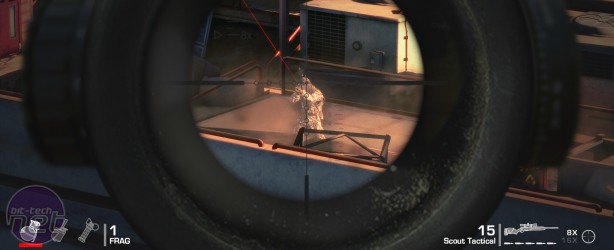Spec Ops: The Line Review
Publisher: 2K GamesPlatform: PC, PS3, Xbox 360
UK Price (as reviewed): £29.99 Incl. VAT
US Price (as reviewed): $49.99 Excl. Tax
Spec Ops: The Line is a third person shooter. It's main characters are American soldiers, fighting in a Arab country. It has a snap-to cover based system, a limit of two weapons for you to carry at any one time, at least one on-rails section and a steady drip-feed of turret sequences.
It is, in other words, exactly the same as nearly every other third person shooter or big-budget action game on the market. It would be an entirely unremarkable and utterly average experience if it weren't for one very specific thing...
Spec Ops: The Line is also an approximate and mighty ambition adaptation of Joseph Conrad's war novel Heart of Darkness, the book which Apocalypse Now was based upon.
There have been some big changes implemented along the way, such as the relocation of the story from Africa to a version of Dubai that's been isolated by sandstorms, but a lot left intact too. Spec Ops uses a slew of Conrad references and an inhospitable, foreign situation as a lens through which to examine the duality of the human condition and the darkness that we are capable of.
The strength of this examination is admittedly slow to build, but that's by no means a bad thing considering the frenetic pace it eventually reaches. The fact that a game which starts off appearing as just another shooter eventually ends with an explicit discussion about the evils men commit in the name of glory and false perspective is in itself a reason why Spec Ops deserves your attention.
This isn't a game about stopping the Russians invading or saving innocent civilians; it's about soldiers and the mistakes they make.
Unfortunately though, while it's admirable that Spec Ops tries to communicate such a powerful and important point, the game is also wounded by its own duality and dark purpose. It may be a game about the horrors of war, but it's also war as non-intellectual, voyeuristic entertainment. It is a game that wants you to feel bad about killing people, while at the same time slipping into slow-motion whenever you score a perfect, gory headshot.
There's an argument that this feeds into a meaningful loop of self-analysis; that the game makes you feel bad for feeling good about killing someone and that this inspires some deeper reflection...but it's mostly rubbish. That's not only a meaning that's so deep down the rabbit hole it eventually becomes self-defeating, but it's also flawed from the basis that these realisations are only meaningful if they arrive naturally, through player choice.
And, though there are choices in Spec Ops: The Line - another thing which immediately separates it off from the bulk of third person shooters and makes it worth a look - those choices aren't always well presented or structured. Take, for example, one segment where you're given the option to either use chemical weapons to clear an enemy base or to try and tackle the enemy head on. The frontal assault is suicide, but the chemical weapon is inhumane, so this should be an interesting choice, right?
Wrong, because there actually isn't a choice here and, if you do decide to fight fairly, invincible enemies will spawn in infinitely and the option to leave the area will never materialise. Even then, Spec Ops doesn't tell you that; the game just reloads and again presents you with a choice - and, if you're like us, you try the battle again. After all, this isn't the first time you've assaulted an enemy base and kill a hundred people in one go while playing, is it?
We played this section for two hours before we relented and used the chemical weapons, only to find that Spec Ops then tries to make you feel guilty for doing so. Our personal response was to swear at the screen and make an explicit note about the poor design for these systems.

MSI MPG Velox 100R Chassis Review
October 14 2021 | 15:04












Want to comment? Please log in.